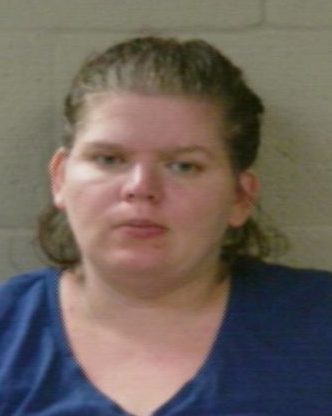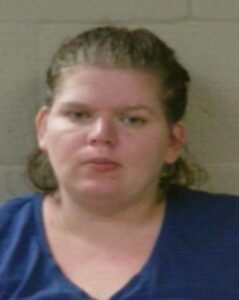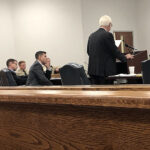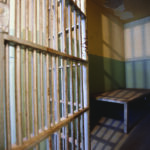

Ashley Thomas sat behind the counsel table, leaning her forehead against clasped hands, as the verdict was read.
The three-day trial, and three-year legal battle, was finally coming to a close in a dimly-lit courtroom as thunder and heavy rain roared overhead.
“I think she wants you in trouble because you didn’t get her out of trouble,” Ashley’s defense attorney Vicky Green had told her in the hall earlier in the day. “I really believe that.”
And it was true, but perhaps not in the way she’d interpreted the statement.
Ashley was on trial because the state alleged she did not protect her daughter from, and even participated in, years of sexual abuse.
That’s the reason everyone was there, after all – to decide whether or not the mother of four was guilty of playing a role in one of the most gruesome sexual abuse cases the court had heard, if she knew and failed to keep her safe or if she really had no idea it was going on.
Ashley testified she didn’t believe her daughter’s story. Not completely.
Who would the jury believe, though?
‘I thought she needed help with homework …’
Ashley’s journey to that moment – the one in which she was waiting to hear if she’d go home to her family or into the prison system – began years earlier.
While spending the weekend with her grandmother in late January 2017, Ashley’s daughter, then 9, told her she “needed help with something.”
“I thought she needed help with homework is what I thought,” Christine Best said. Her granddaughter told her David Henson, Ashley’s boyfriend at the time, had been “touching her in the wrong spots.”
“I felt like it was the truth that she was telling me,” Christine, who was a witness for the prosecution, testified. She told the court the abuse seemed to have been going on for awhile and her granddaughter told her she was afraid her mother wouldn’t believe her.
From there, Christine told Ashley she would not be returning the 9-year-old or her 7-year-old sister, who was living with Christine at the time, and she could meet her at the police station.
Ashley called a Munford police officer with whom she was acquainted, hoping to get help with what seemed like a custody matter, and was redirected to the police station.
That night, Ashley and her children spent the night at a hotel paid for by Amanda’s Way, a local non-profit whose goal is to remove women and children from abusive situations. David spent the night at their Oakwood Court mobile home.
Ashley would soon return, but without her daughters.
The girls, including another daughter who turned a year old the day after the allegations were made, were removed from her care and Ashley went back home with David.
Three days later, Ashley and David allowed Detective Bert Zickefoose and other Munford officers to search their trailer. Forensic interviews were conducted with both of the older girls.
It all set into a motion a case whose facts, which the victim called “nasty things” in her interview, were explicit. It is the policy of The Leader to limit details in sexual abuse cases, however, even if that were not the case, the details are too graphic to publish.
‘Pretty much every day’
The video of the forensic interview took the jury one hour, 45 minutes to watch.
In it, the nine-year-old victim matter-of-factly discusses having the “best teacher ever” and wanting to spend the night at her “best best” friend’s house before recounting years of physical abuse, grooming and horrific sexual abuse.
“He used to do it a lot, pretty much every day,” she said, noting it was part of Ashley and David’s regular nighttime routine of adult-related activities.
Though her statements about the events often included her mother as a participant or spectator, she did tell the forensic investigator her mother wasn’t home when a lot of it happened.
In defending Ashley, Green suggested this was proof the child was coerced.
Was she telling the investigator about events which had actually happened to her or things she’d witnessed over the course of her abuse?
The proof was in the details of the child’s statement, said prosecutor Walt Freeland.
“How would she know that unless she did it?”
Whose side is she on?
Ashley’s allegiance to David was one of the cornerstones of the prosecution’s case.
They met online in 2015 after she’d left an abusive partner who put her in the intensive care unit. They spoke with each other for a few days, then met in person and moved into a duplex together within a matter of weeks.
David, who is currently serving a 25-year sentence for the exploitation and rape of Ashley’s child, testified Wednesday about the timeline of their relationship.
From the duplex in Covington they moved into a mobile home in Munford, he said. Ashley was pregnant with her third child. Their relationship was on and off for the most part, especially after the allegations, which he calls lies, came to light.
“We were fighting because her mom was making these stories up,” he said. “Her mom was lying on me.”
He said they were working on their relationship during the legal battle that followed. Ashley was a witness during his trial and sat behind him once she’d testified. She cried in court when he was led away by deputies.
“She cried for you,” Freeland suggested to David.
“She was on my my side,” he replied.
“She’s just as innocent as you?”
“Yes,” he responded, readjusting his mask with shackled hands.
When he was being cross-examined, David told Green that Ashley was crying because she lost him.
“She felt like she lost everything.”
At that point, Ashley’s children had been adopted by their foster mother. She’d lost her home and her job. And now she’d lost David, too.
Both David and Ashley testified that Ashley loved her children – “with everything,” as Ashley put it – but love doesn’t always translate to supporting your children when they need it.
Ashley testified she “was confused” and needed “to investigate more” before she knew who to believe. Even after David’s guilty plea.
“Did you want David to be found guilty?” asked prosecutor Jason Poyner.
“I believed at the time that he was innocent,” Ashley testified. “Now I believe he’s guilty. I didn’t have enough information. No one was giving me answers.”
Contradicting her own testimony several times, Ashley said she didn’t think her daughter had been subject to abuse but that some of her allegations seemed to be reminiscent of situations she may have witnessed. Though she repeatedly testified she didn’t believe her daughter’s story in its entirety, she also testified she would have.
“If she was brave enough to tell me, I’d believe her,” she said.
“Believing her daughter’s story would implicate her,” prosecutors said during closing arguments.
When she testified Wednesday, Ashley’s daughter said she didn’t believe her biological mother was on her side at all and when she cried during the last trial she’d been crying for David alone.
“How are you on my side if you let that happen to me?” her daughter asked her. “If she was crying for me, she would have stopped it … if she was crying for me, she would have been clapping.”
‘I’m a young woman with a voice’
Once David went to prison, their relationship continued in some manner. Then Ashley met a new man and moved in with him. In November 2018 she was indicted for the role the state alleged she played in the abuse. She was booked into the jail when seven months pregnant.
She gave birth to her fourth daughter and gave her nearly the same name as the daughter at the center of the case, a daughter who was no longer legally hers.
When they knew about their new sister, the older sisters wanted to meet her. They talked with Ashley on the phone and it didn’t go well.
The victim, who was now 10, sent text messages to Ashley because she was angry over her new sister’s name. She pleaded with Ashley to send the baby to live with them to keep her safe, called David a monster, and told her she hated her.
Ashley told her daughters they could see their sister if they “didn’t say anything.”
“I don’t want to see you except in court,” the texts from the victim read. “I’m a young lady with a voice now and I will use it. You don’t hurt people and get away with it.”
The victim, who is now 12, also told her mother she hoped she stayed in jail as long as David.
“She never even told me she was sorry,” the victim testified Wednesday.
Green, in her opening statements once the state rested its case, said she’d never intended to have the victim testify.
“A child shouldn’t be put through this.”
The storm was finally over
The trial’s end was anti-climatic, really.
There was no overt display of emotion from anyone in the courtroom as the forewoman read the verdict. There was no crying, there was no clapping.
Ashley kept her head against her clasped hands as they jury delivered the news they’d believed her daughter.
They found Ashley guilty on two counts of aggravated child neglect, one count of facilitation of sexual exploitation of a minor, three counts of sexual exploitation of a minor, three counts of criminal responsibility for rape of a child and two counts of continual sexual abuse (child protection act).
She was found not guilty on one count of criminal responsibility for rape of a child and one count of aggravated sexual battery by an authority figure.
Though Green fought to keep her out, Ashley was immediately taken into custody and booked into the jail. She will be sentenced on Aug. 28, then will be remanded into the custody of the Tennessee Department of Corrections.
Ashley’s former daughter walked out of the courtroom with her adoptive mother and several lawyers who’d worked on their behalf in chancery court.
She and her sisters have moved away from Tipton County and have chosen new names for themselves. They are safe. They are happy and thriving. Their body language gives it away.
It had finally quit storming.
“That was a long time coming,” attorney Kasey Culbreath told the victim as soon as they got outside. “That was all you.”






Leave a Reply